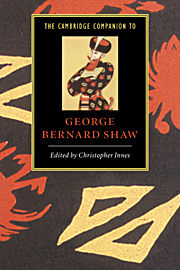Book contents
- Frontmatter
- Part 1 The social and cultural context
- Part 2 Shaw the dramatist
- 5 Shaw's early plays
- 6 Shavian comedy and the shadow of Wilde
- 7 Structure and philosophy in Man and Superman and Major Barbara
- 8 “Nothing but talk, talk, talk - Shaw talk”
- 9 The roads to Heartbreak House
- 10 Reinventing the history play
- 11 Shaw's interstices of empire
- 12 The later Shaw
- Part 3 Theatre work and influence
- Index
11 - Shaw's interstices of empire
decolonizing at home and abroad
from Part 2 - Shaw the dramatist
Published online by Cambridge University Press: 28 May 2006
- Frontmatter
- Part 1 The social and cultural context
- Part 2 Shaw the dramatist
- 5 Shaw's early plays
- 6 Shavian comedy and the shadow of Wilde
- 7 Structure and philosophy in Man and Superman and Major Barbara
- 8 “Nothing but talk, talk, talk - Shaw talk”
- 9 The roads to Heartbreak House
- 10 Reinventing the history play
- 11 Shaw's interstices of empire
- 12 The later Shaw
- Part 3 Theatre work and influence
- Index
Summary
Playing around the edges of monolithic binaries is one of Shaw’s trademarked strategies. Some might call it his perversity, others the common stock of comedic reversal. A more precise technical term might be parataxis: the setting side by side of statements or concepts without explicitly indicating their relationship. As an ironicist, Shaw consistently draws out our assumptions about the relationship, teases out unexpected complications from the logical follow-through of those assumptions, then displays the fallacy of the universe being as simple and stable as we might ever assume. The paratactic concepts frequently resemble the most familiar tropes of dramatic literature: the struggle between the sexes, monogamy versus infidelity or polygamy, class conflict, and the native versus the foreign. But just as Britain was a hybrid of many nations, the Empire was a hybrid of many peoples, and iconoclasts were made by many forces, Shaw's plays are complicated by more than merely the rivalry of women and men, the contest between poet and philistine, the incompatibility of hero and coward, or the mutual exclusivity of respectability and unfettered naturism. Rather, his plays frequently are exercises in the theatricalization of performances around and between such concepts. Altogether, they suggest prolonged meditation on the dilemma of colonization: never achieving postcolonialism because institutions of power are not dismantled, but exploring the varieties of subjection resulting from policies of hegemony metonymically embodied.
- Type
- Chapter
- Information
- The Cambridge Companion to George Bernard Shaw , pp. 218 - 239Publisher: Cambridge University PressPrint publication year: 1998
- 4
- Cited by

